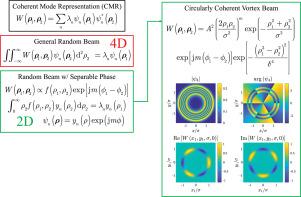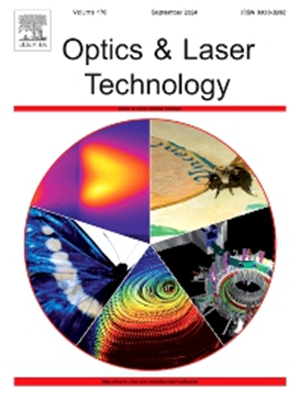具有可分离相位的部分相干光束的高效相干模式数值表示法
IF 5
2区 物理与天体物理
Q1 OPTICS
引用次数: 0
摘要
我们提出了一种方法,用于数值计算具有可分离相位的部分相干光束的相干模式表示(CMR)。这种特殊的随机光场具有自聚焦能力,并能抵抗湍流引起的衰减,因此在光通信等应用中具有潜在的用途。我们通过(模拟)生成文献中的两个此类光源,并使用其计算出的 CMR 验证了我们的方法。最后,我们总结了我们的方法并讨论了其应用。本文章由计算机程序翻译,如有差异,请以英文原文为准。

Numerically efficient coherent mode representations for partially coherent beams with separable phases
We present a method to numerically compute the coherent mode representations (CMRs) for partially coherent beams with separable phases. This special class of random light field has the ability to self-focus and is resistant to turbulence-induced degradation, making it potentially useful in applications such as optical communications. We validate our method by generating (in simulation) two such sources from the literature using their computed CMRs. Lastly, we conclude with a summary of our approach and a discussion of applications.
求助全文
通过发布文献求助,成功后即可免费获取论文全文。
去求助
来源期刊
CiteScore
8.50
自引率
10.00%
发文量
1060
审稿时长
3.4 months
期刊介绍:
Optics & Laser Technology aims to provide a vehicle for the publication of a broad range of high quality research and review papers in those fields of scientific and engineering research appertaining to the development and application of the technology of optics and lasers. Papers describing original work in these areas are submitted to rigorous refereeing prior to acceptance for publication.
The scope of Optics & Laser Technology encompasses, but is not restricted to, the following areas:
•development in all types of lasers
•developments in optoelectronic devices and photonics
•developments in new photonics and optical concepts
•developments in conventional optics, optical instruments and components
•techniques of optical metrology, including interferometry and optical fibre sensors
•LIDAR and other non-contact optical measurement techniques, including optical methods in heat and fluid flow
•applications of lasers to materials processing, optical NDT display (including holography) and optical communication
•research and development in the field of laser safety including studies of hazards resulting from the applications of lasers (laser safety, hazards of laser fume)
•developments in optical computing and optical information processing
•developments in new optical materials
•developments in new optical characterization methods and techniques
•developments in quantum optics
•developments in light assisted micro and nanofabrication methods and techniques
•developments in nanophotonics and biophotonics
•developments in imaging processing and systems

 求助内容:
求助内容: 应助结果提醒方式:
应助结果提醒方式:


